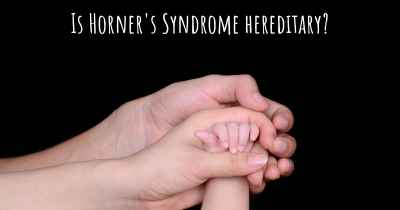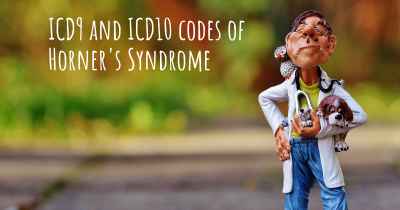Living with Horner's Syndrome. How to live with Horner's Syndrome?
Can you be happy living with Horner's Syndrome? What do you have to do to be happy with Horner's Syndrome? Living with Horner's Syndrome can be difficult, but you have to fight to try to be happy. Have a look at things that other people have done to be happy with Horner's Syndrome

Living with Horner's Syndrome
Horner's Syndrome is a rare condition that affects the nerves in the face and eyes, resulting in a range of symptoms such as drooping eyelids, constricted pupils, and decreased sweating on one side of the face. While living with Horner's Syndrome can present challenges, there are strategies and treatments available to help manage the condition and improve quality of life.
Medical Management
If you have been diagnosed with Horner's Syndrome, it is crucial to work closely with your healthcare team, including ophthalmologists, neurologists, and otolaryngologists, to develop an appropriate treatment plan. The underlying cause of Horner's Syndrome will determine the specific approach to managing the condition.
Treatment options may include:
- Addressing the underlying cause: In some cases, treating the underlying condition that caused Horner's Syndrome, such as a tumor or injury, may help alleviate symptoms.
- Medications: Certain medications, such as apraclonidine or phenylephrine eye drops, can help improve drooping eyelids and pupil constriction.
- Physical therapy: Working with a physical therapist can help improve muscle strength and coordination, particularly if facial muscles are affected.
Eye Care
Proper eye care is essential for individuals with Horner's Syndrome to maintain optimal vision and eye health. Consider the following:
- Regular eye examinations: Schedule regular visits with an ophthalmologist to monitor any changes in vision and assess the overall health of your eyes.
- Eye protection: Wear sunglasses or protective eyewear when exposed to bright lights or harsh environmental conditions to prevent further eye irritation.
- Eye lubrication: Use artificial tears or prescribed eye drops to alleviate dryness or discomfort caused by decreased tear production.
Self-Care and Lifestyle
Living with Horner's Syndrome involves making certain adjustments to daily life to manage symptoms and promote overall well-being:
- Manage stress: Stress can exacerbate symptoms, so finding healthy ways to cope with stress, such as practicing relaxation techniques or engaging in hobbies, is important.
- Eye exercises: Your healthcare provider may recommend specific eye exercises to improve muscle strength and coordination.
- Good sleep hygiene: Prioritize quality sleep by establishing a regular sleep schedule and creating a comfortable sleep environment.
- Healthy lifestyle: Maintain a balanced diet, engage in regular physical activity, and avoid smoking to support overall health and well-being.
- Support network: Seek support from family, friends, or support groups to share experiences, gain emotional support, and exchange coping strategies.
Education and Awareness
Increasing awareness about Horner's Syndrome among your family, friends, and coworkers can help them understand the challenges you may face. Educating others about the condition can foster empathy and create a supportive environment.
Consider the following:
- Open communication: Clearly communicate your needs and limitations to those around you, helping them understand how they can assist or accommodate you.
- Information sharing: Share educational resources or websites about Horner's Syndrome to help others learn more about the condition.
- Advocacy: Consider participating in local or online support groups, or even becoming an advocate for individuals with Horner's Syndrome to raise awareness and promote research.
Living with Horner's Syndrome may present challenges, but with proper medical management, self-care, and support, individuals can lead fulfilling lives. Remember to consult with your healthcare team for personalized advice and guidance.








